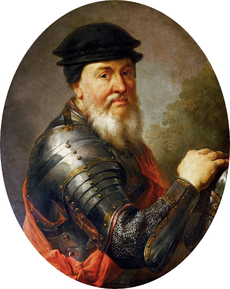Jan Amor Tarnowski
|
Hetman Jan Amor Tarnowski |
|
|---|---|
  |
|
| Coat of arms | Leliwa |
| Spouse(s) |
Barbara Tęczyńska Zofia Szydłowiecka |
|
Issue
with Barbara Tęczyńska
Jan Aleksander Tarnowski Jan Amor Tarnowski with Zofia Szydłowiecka Zofia Tarnowska Jan Krzysztof Tarnowski |
|
| Noble family | House of Tarnowski |
| Father | Jan Amor Junior Tarnowski |
| Mother | Barbara of Rożnów |
| Born | 1488 Tarnów, Poland |
| Died | May 16, 1561 (aged 72–73) Wiewiórka, Poland |
Jan Amor Tarnowski (Latin: Joannes Tarnovius; 1488–1561) was a Polish nobleman, knight, military commander, military theoretician, and statesman of the Crown of the Kingdom of Poland. He was Grand Crown Hetman from 1527, and was the founder of the city of Tarnopol, where he built the Ternopil Castle and the Ternopil Pond.
Tarnowski was born in 1488, the son of Jan Amor Junior Tarnowski, castellan of Kraków, and his second wife Barbara of Rożnów, granddaughter of the knight Zawisza the Black. He was a scion of an important family clan started in the mid-14th century by Spycimir Leliwita, castellan of Kraków. Tarnowski had five half-siblings from his father's first marriage: Jan Amor the Elder, Jan Aleksander (d. 1497), Katarzyna, Zofia and Elżbieta. He had also five half-sisters from his mother's first marriage. He spent his earliest years in Rożnowo and Stare Sioło. He was originally intended to become a priest; but after his father's death in 1500, his mentor Maciej Drzewiecki convinced Barbara of Rożnowo to abandon this plan. In 1501, Tarnowski was sent to the king's court; but on 17 June 1501, king John I Albert died and he returned to Rożnowo, to his mother's domain.
In 1508, Tarnowski fought against Muscovy in the battle of Orsza; in 1509, against Moldavia in the battle of Chocim, and upon the Dniester as a commander of his own chorągiew (banner/company). In 1512, he was involved in the battle of Łopuszna, in which the Tatars were defeated by the Polish forces.
He made a pilgrimage to the Holy Land, and in 1518 became a knight of the Order of the Holy Sepulchre in Jerusalem. He travelled extensively across Europe, and was knighted by king Manuel I of Portugal for his services against the Moors in Africa.
...
Wikipedia
